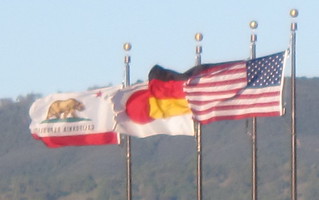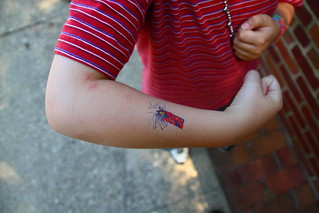“…and to the Republic, for which it stands…”
It’s easy enough to avoid American nationalism in the form of the anthem or the flag. Just come late to a game or a classroom. Slip in behind the Scouts or the Pathfinders as they march proudly onward with the Colors. While there are so many people don’t know all the words to the Pledge and to the Anthem, I do – I always have, though I never considered myself someone terribly patriotic. I just didn’t mumble. If I was going to say a thing, I was going to mean the thing. That’s just how I am. I am one of those weirdies who look up and READ the lyrics of songs, and sometimes, I don’t sing them because they’re words I can’t get behind. From Top 40 pop music to hymns, I’ve always been that way. As my friend and fellow English teacher Susan Goins always said, “Words. Have. Power.”
I became deeply uncomfortable with the words to the pledge years ago, but didn’t decide to stop participating in its recital until early 2014, when so many of the things which complicate my relationship with the United States came together in a perfect storm. Again, not someone who would simply mumble, or la-la-la my way through the parts I didn’t like, I heard the words and realized that I could no longer give unquestioning allegiance to the decayed and listing Republic. As you are perhaps rearing back in shocked affront, imagine how it upset me. Additionally, during the past couple of years, my relationship with church also got the “It’s Complicated” tag on my imaginary FB page – as there are things with the church in which I was raised that are also so anathema to me personally, so insular and content with it – that I don’t know how to integrate them with who I am as an adult.
All this to set the scene for my story.There are multiple occasions for the winnowing of beliefs in adulthood. Values form and clarification is not always the most fun of work, but if it doesn’t get done, you’re staying a nymph instead of a dragonfly, capisci? (And eventually, the nymphs eat all the food in the pond, and can’t fly away, so they die. FYI.)
So, I attended church this weekend, which was an International Celebration spearheaded by the community’s teens. I was prepared for much of what it was – cheerfully chaotic, cheesy, and very, very cute. There are something like thirty nations represented within our one congregation, which meant that the scripture was read in Haitian French, Peruvian Spanish, the Maori language as well as English, and the hymn was sung in Tagalog, Swahili, Spanish, Samoan and English. This also meant the service was amusingly interminable (we were fortunate the speaker graciously bowed out), but full of heartening moments as we acknowledged the immigrant and the “stranger within our gates” with the renewed commitment to them as family. Despite myself, I warmed to the familiar concepts.
The Flags of Many Nations procession was my very favorite thing, as little kids, big kids, and sometimes whole families paraded down the aisle in national costume, waving their flag, while an (increasingly shorter as the service dragged on) clip of their national anthem was played. I loved seeing the participation, the joy and pride. When the Kenyan kids stood and saluted their flag as it passed, little bodies ramrod straight and eyes bright, my heart pinched a bit. I remembered what that was like – that unstinting, unhesitating love for my country. I found my eyes smarting with tears – and then, I went lightheaded for a moment, as a wild, unfathomably deep scream of rage boiled up from deep within – at how that has been irrevocably taken away from me.
“…One nation, under God, indivisible…”
And oh, the sucker punch when my own flag stuttered haltingly up the aisle on the shoulder of a Korean War veteran. Oh, the pinch. I was already there, though. No avoiding this. No quietly slipping out. It was take a knee, or… or… I couldn’t decide.
The old people around us were dabbing their eyes. The kids were beaming, happy their program was a.) Nearly over and b.) Such a success. Would anyone there understand what taking a knee – in church – was about? Had any of the teens, people, who were raised sheltered, insular and oblivious like me, did they eve understand the importance of Colin Kaepernick? The brutality of our national relationship with law enforcement and people of color? The necessity – the responsibility – of all citizens to push back and resist? Would what I was about to do make any difference to their understanding? I’m sure you can imagine the wash of conflicting feelings flowing over me. We were supposed to be celebrating our exclusivity and diversity. We were meant to leap to our feet, our hearts beating as one in proud agreement that we all loved our country.
Everyone surged to their feet. I, too, found my feet – bitterly unhappy that I didn’t have the courage to kneel – that it wouldn’t have made the difference we need. That maybe nothing will. I stood, yes. But with my arms crossed, my head bowed, and my face wet.
“…with Liberty and Justice for all.”



